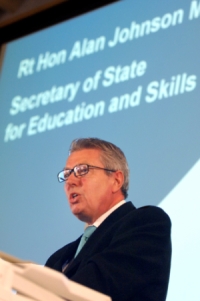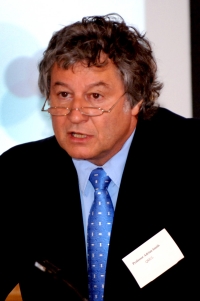
Teaching excellence

Education Secretary Alan Johnson at the NCETM launch last week.
Last week Education Secretary Alan Johnson launched the National Centre for Excellence in the Teaching of Mathematics (NCETM). The Centre, funded by £15 million worth of government money, is designed to support the professional development of teachers of mathematics at every stage of their career and across every age-range from primary to adult education.
At the launch in Coventry's TechnoCentre on the 27th of June, the Secretary of State was joined by Professor Celia Hoyles, Chief Adviser for Mathematics for the Department of Education and Skills and Professor Adrian Smith, author of the influential inquiry into post-16 mathematics education. Summarising the aim of the Centre Mr Johnson said: "Having sound mathematics skills is a fundamental part of every child's education and we are committed to ensuring that today's children and young people get every opportunity and support to learn and develop those skills. To do this, we need to make sure that mathematics teachers are also getting the support and professional development they need. That is why this centre is so important, providing a vital tool for the teaching community."
The Centre will exist chiefly as a web portal, www.ncetm.org.uk, intended to enable everyone involved in the teaching of maths to get together and share practice and information. The website will give teachers the chance to discuss the impact of their work on learning, join discussion forums on current issues, contribute to educational web logs, explore a comprehensive external links directory and access continuing professional development opportunities. Reaching beyond the web, the NCETM also plans to develop nine regional teams across England working to link all those involved in mathematics education and encouraging teachers to become involved in collaborative professional development locally.

Professor Adrian Smith at the NCETM launch last week.
The NCETM project is the latest result of an ongoing process that was first sparked by the Smith report in 2004 (see The Smith report: making mathematics count). In his report, Adrian Smith gave a damning verdict on the state of maths education in the UK and identified a lack of qualified and inspirational maths teachers as one of the root causes. Continuing professional development for maths teachers is seen as a key remedy, but it also places a huge burden on teacher's time which usually is in short supply. "Teachers don't have a lot of time to research professional development opportunities," said Barry Brooks, Director of Lifelong Learning at Tribal Education, the group which co-ordinates the NCETM together with the University of Plymouth. "They need one port of call for finding new ideas for their lessons and ways of collaborating with colleagues."
It is hoped that the NCETM portal will become this port of call, binding together not only the teaching community but also other organisation that have an interest in maths education, such as industry, universities, local education authorities, mathematics associations and existing education networks and strategies. As Professor David Burghes, Director of NCETM, said at the launch, linking up the maths community is the key idea behind the initiative: "We want to inspire joined-up thinking to improve maths teaching and learning in every school and college. We want to get everyone involved and provide support that is of genuine use to practitioners across every area of mathematics education."
Having been tested out on a group of teachers, the NCETM portal will now face the critical judgement of teachers nationwide, but also seek their input, as each new section of the portal will be built on users' feedback. The next phase will see the addition of a directory of regional and national professional development opportunities.